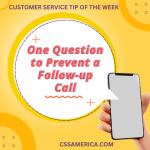A company was selling advertising space for a publication to be distributed to law firms across the region. Christine, the publisher’s sales representative, had left a message on my voice mail stating that she would e-mail details on pricing and distribution.
Later that day, I received an e-mail (from a generic e-mail address) with all the information that Christine had mentioned. Since our company has no law firms as clients and does not target that industry, we had no interest in buying ad space. So, I pleasantly responded to the e-mail that I was not interested.
About one week later, Christine called to remind me of the e-mail that her company had sent and to say that if I wanted to buy, I had to do it by the end of the day. My opinion of her company immediately plummeted. Why?
The concept of Customer Relationship Management has two core characteristics. The first is that any marketing or service contact to a client is customized based on that client’s unique interests and characteristics. The second is that multiple typically disparate functions (such as call centers, customer databases, e-mail applications, web sites, etc.) are all integrated so as to share access to this client information.
This company failed on both counts. First, they had no qualification of our interest in advertising. We’ve never worked with a lawyer or attempted to work with legal firms as clients. Second, their e-mail marketing system obviously didn’t feed information to their sales representatives since our response declining their offer never reached Christine.
This mismanagement of communications wasted my time in responding to two calls and one e-mail and wasted their time in first marketing to and then unnecessarily following up with a disinterested prospect. They lost credibility and created more work for themselves.
Think about how you manage communications and relationships with your customers FROM YOUR CUSTOMER’S PERSPECTIVE. Target and coordinate communications to reduce your workload and maintain corporate credibility.
Read our New Book – “Ask Yourself…Am I GREAT at Customer Service?” http://www.amigreatat.com/
Interested in improving your company’s customer service? See more at our new website! http://www.cssamerica.com/





















